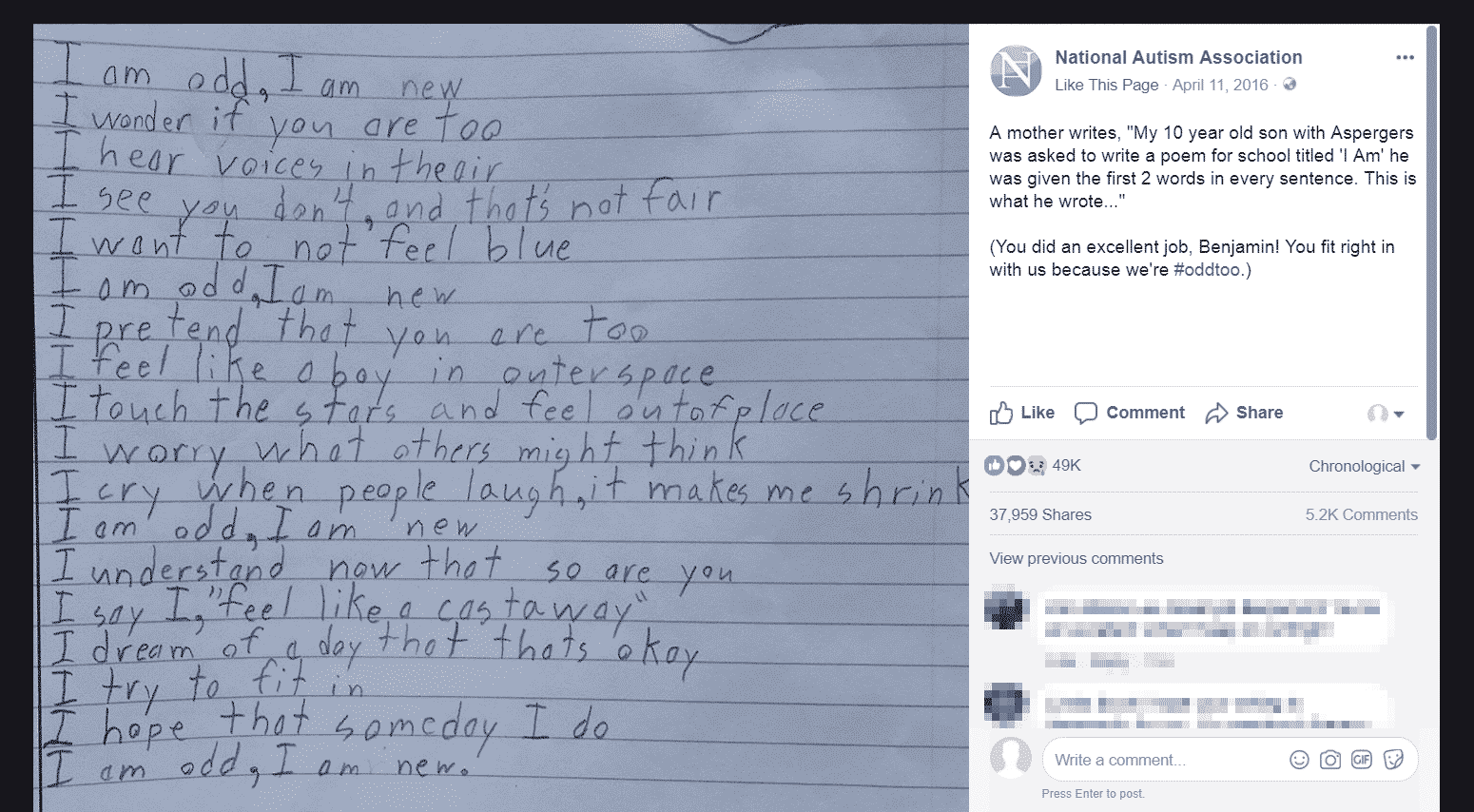
This poem is one of the most liked and most shared posts by National Autism Association’s FB page. “I am” was written by Benjamin Giroux, 10 years old, with Asperger’s syndrome. It is very admiring how Benjamin perfectly put each word in every line to illustrate how his world looks like and how the world sees him. The poem is genuinely touching and somehow heartbreaking!
“I feel like a boy in outer space
I touch the stars and feel out of place…
I say “I feel like a castaway
I dream of a day that that’s okay
I try to fit in
I hope that someday I do…”
Autismspeaks said “Asperger syndrome was generally considered to be on the “high functioning” end of the spectrum. Affected children and adults have difficulty with social interactions and exhibit a restricted range of interests and/or repetitive behaviors. Motor development may be delayed, leading to clumsiness or uncoordinated motor movements. Compared with those affected by other forms of ASD, however, those with Asperger syndrome do not have significant delays or difficulties in language or cognitive development. Some even demonstrate precocious vocabulary – often in a highly specialized field of interest.”
The following behaviors are often associated with Asperger syndrome. However, they are seldom all present in any one individual and vary widely in degree:
- limited or inappropriate social interactions
- “robotic” or repetitive speech
- challenges with nonverbal communication (gestures, facial expression, etc.) coupled with average to above average verbal skills
- tendency to discuss self rather than others
- inability to understand social/emotional issues or nonliteral phrases
- lack of eye contact or reciprocal conversation
- obsession with specific, often unusual, topics
- one-sided conversations
- awkward movements and/or mannerisms
VIEW FULL ARTICLE HERE: Asperger Syndrome
According to AutismSociety, diagnosis of Asperger’s Disorder has increased in recent years, although it is unclear whether it is more prevalent or more professionals are detecting it. When Asperger’s and autism were considered separate disorders under the DSM-IV, the symptoms for Asperger’s Disorder were the same as those listed for autism; however, children with Asperger’s do not have delays in the area of communication and language. In fact, to be diagnosed with Asperger’s, a child must have normal language development as well as normal intelligence. The DSM-IV criteria for Asperger’s specified that the individual must have “severe and sustained impairment in social interaction, and the development of restricted, repetitive patterns of behavior, interests and activities that must cause clinically significant impairment in social, occupational or other important areas of functioning.”
The first step to diagnosis is an assessment, including a developmental history and observation. This should be done by medical professionals experienced with autism and other PDDs. Early diagnosis is also important as children with Asperger’s Disorder who are diagnosed and treated early in life have an increased chance of being successful in school and eventually living independently.
To learn more about Asperger’s History and other Characteristics visit full article here.
ThoughtCo describes Asperger’s Syndrome by:
> Areas of High Interest and High Ability
The hyper-focus or perseveration on specific top is typical of students diagnosed with Asperger’s Syndrome. Children may exhibit exceptional ability in language or math and may have areas of extraordinary ability.
This hyperfocus or perseveration may actually be the result of Obsessive Compulsive Disorder (OCD) which is not uncommon in children with Asperger’s disorder. Physicians often can use appropriate medication to help manage the obsessive behavior and help students re-focus on a broader range of information and interests.
> Social Deficits
One of truly human skills that children on the spectrum seem to lack is “joint attention,” the ability to join with other humans in attending to what they find important. Another deficit is in the area of “theory of mind,” the innate ability that most human organisms have to project their own emotional and intellectual processes onto other human beings. Children with Asperger’s syndrome often long to develop relationships, especially with peers. Since most children with Asperger’s Syndrome are boys, they are especially interested in how to relate to the opposite sex. They lack emotional literacy and need explicit instruction in how to recognize and manage different emotional states. “Use your words” is often the mantra with students with Asperger’s Syndrome, and often the challenge is teaching them the skills they need to express their wants and needs.
> Executive Function Deficits
Children with Asperger’s Syndrome often have weak “Executive Function.” Executive function is the cognitive ability to visualize and plan ahead. It includes the short term ability to understand the steps needed to complete a task.
> Gross and Fine Motor Skills
Students with Asperger’s Syndrome often have poor balance and poor gross motor skills. These same students may also have poor fine motor skills and may dislike using pencils and scissors.
> Academic Deficits
Students with Asperger’s syndromes often have areas of great strength and areas of academic weakness.
- English/Language Arts: Often students with strong language may struggle to develop the skills that they need to do well in English and Language Arts. Often they have strong vocabularies, especially when they have strong interests that they have read about.
- Math: Children with strong language or reading skills may have poor math skills or vice versa.
Do you have students diagnosed with Asperger’s Syndrome? This article released by researchautism is for you!
Life Journey Through Autism: An Educator’s Guide to Asperger Syndrome
In the article, you will have an in-depth understanding of Asperger’s Syndrome, the six-step plan, and IEP and transition planning.
MORE ASPERGER’S SYNDROME RESOURCES HERE: USAAUTISM.ORG
We are not affiliated with any of these bloggers or organizations. But we believe that they shared valuable articles about Asperger’s Syndrome. We thought that this might help you succeed in understanding more and teaching your students with Asperger’s syndrome. Because like Benjamin, we have high hopes that one day children with Asperger’s syndrome will not feel like a castaway or feel out of place in this world we live-in.



